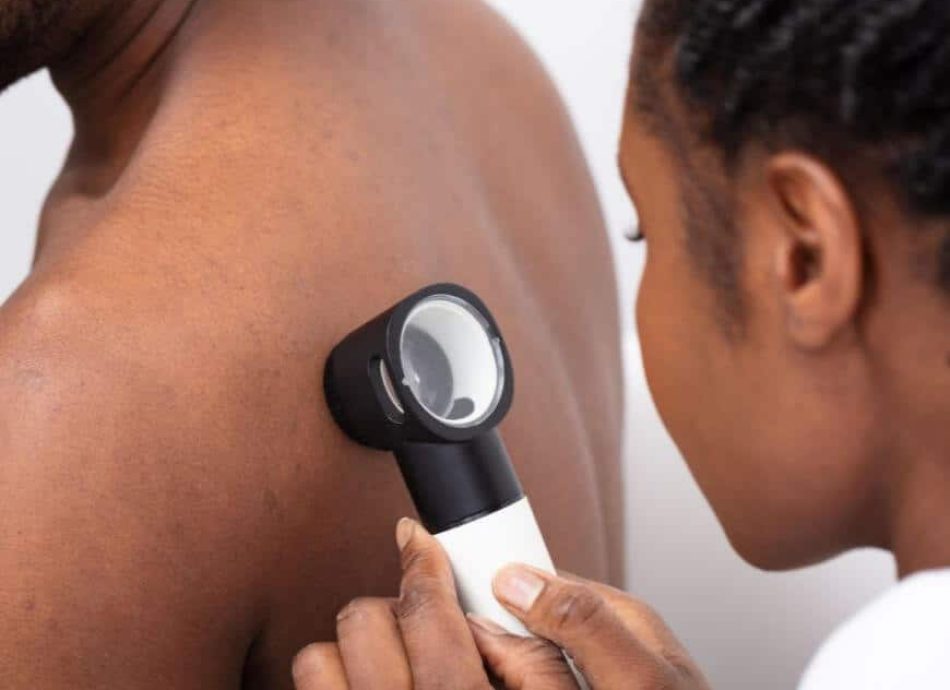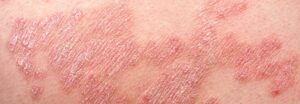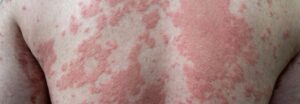Award winning dermatology service, with over 20 years of experience
Short waiting lists, on some occasions offering same week appointments
Safe environment, in Care Quality Commission approved facilities
Skin Tags Treatments
SKIN TAG REMOVAL CLINIC IN CANTERBURY IN Canterbury & Kent
Skin tags are small, harmless growths that hang off the skin and look similar to warts. They are typically flesh-coloured or brown, and vary in size from a couple of millimetres up to 5cm wide.
Anyone can develop skin tags at any stage in their life, but they’re most common in older people and those with diabetes; pregnant women may also develop them due to hormonal changes.
Skin tags can commonly be found on the neck, in the armpits, under the breasts, in the groin area, on the eyelids, or on the bottom, among other places.
Most of the time they are harmless and don’t cause any pain or discomfort. However, depending on where they are located, you may find that they rub or snag on your clothing causing some amount of discomfort. In addition to this, skin tags can sometimes be unsightly and can cause the person to feel self-conscious or embarrassed by their presence.
Skin Tag Or Wart
Skin tags and warts can often be mistaken for one another, and whilst neither is typically painful or cancerous, warts are contagious and can spread easily so it’s best to have them removed by a specialist.
There are a few ways that you can tell if you’re dealing with a skin tag or a wart:
- Skin tags tend to be smooth and soft, whilst warts are typically rougher with an irregular surface
- Warts usually lay flat on the skin, whilst skin tags are knobbly and hang off the skin
- Warts are contagious and tend to develop in sudden outbreaks and clusters, whilst skin tags are not contagious and tend to be isolated in their appearance
SNIP CAUTERY
FREQUENTLY ASKED QUESTIONS
SKIN TAG OR WART?
Skin tags and warts can often be mistaken for one another, and whilst neither is typically painful or cancerous, warts are contagious and can spread easily so it’s best to have them removed by a specialist.
Skin tags can commonly be found on the neck, in the armpits, under the breasts, in the groin area, on the eyelids, or on the bottom, among other places. Most of the time they are harmless and don’t cause any pain or discomfort. However, depending on where they are located you may find that they rub or snag on your clothing causing some amount of discomfort. In addition to this, skin tags can sometimes be unsightly and can cause the person to feel self-conscious or embarrassed by their presence.
There are a few ways that you can tell if you’re dealing with a skin tag or a wart:
- Skin tags tend to be smooth and soft, whilst warts are typically rougher with an irregular surface
- Warts usually lay flat on the skin, whilst skin tags are knobbly and hang off the skin
- Warts are contagious and tend to develop in sudden outbreaks and clusters, whilst skin tags are not contagious and tend to be isolated in their appearance
HOW COMMON ARE WARTS AND VERRUCAE?
Most people will have warts at some point in their life, though they tend to affect children and young adults. Warts are generally not painful, though verrucae can be sore to stand on. Some people find their warts embarrassing and those on the fingers may interfere with normal daily activities.
Without treatment, the length of time it takes a wart to disappear will vary between people. As a rough guide, about a third of warts have gone within three months, and most will have resolved within 2 years. Verrucae can take a lot longer than this to disappear.
HOW CAN I PREVENT WARTS AND VERRUCAE FROM SPREADING?
- Wash your hands after touching a wart or verruca
- Change your socks daily if you have a verruca
- Cover warts and verrucae with a plaster when swimming
- Take care not to cut a wart when shaving
- Don’t share towels, flannels, socks or shoes
- Don’t bite your nails on fingers with warts on
- Don’t walk barefoot in public places if you have a verrucae
- Don’t pick or scratch at them
REQUEST A CALL BACK
Please fill in this form and one of our team will give you a call back to arrange a consultation with one of our expert dermatologists.

What our Customers Say
WHY TREAT YOUR SKIN TAGS AT CANTERBURY SKIN AND LASER CLINIC?
Here at Kent’s leading private skin and laser clinic, our experts are specialists in all aspects of dermatology, skin cancer, anti-ageing and beauty treatments. We are one of the few skin clinics in the UK where all medical consultations and treatments are provided by specialist doctors with Dermatology experience and laser training.
Canterbury Skin and Laser Clinic is regulated by the Care Quality Commission, ensuring the best level of treatment is provided to you in a safe environment. Our Clinical Lead Dr Mark Hudson-Peacock is a member of the British Association of Dermatologists, the British Laser Medical Association, the British Hair and Nail Society, the European Academy of Dermatology and Venereology and is certified by the Consulting Room. We have won many awards including the WhatClinic Patient Service Award in 2019 and the ghp Healthcare and Pharmaceutical Awards 2019.
latest INSIGHTS AND ADVICE

Complete Fall Skincare Guide
Embrace the season of transformation – Autumn. With its vibrant hues, this magical time of year also brings unique challenges for your skin. As the crisp air sets in and the days grow shorter, it’s not only autumn we’re welcoming but also the reminder that

Comprehensive Guide to Understanding Eczema
October is globally observed as Eczema Awareness Month, drawing focus to the people grappling with this challenging skin condition. Our mission, not just in October but always, is to empower you with robust knowledge about eczema‘s root causes, various treatments and useful coping techniques. This

Unravelling Psoriasis: The Focus of Psoriasis Awareness Month
Each August, we commemorate Psoriasis Awareness Month, a time dedicated to elevating public understanding of psoriasis – a chronic skin ailment affecting countless individuals worldwide. The initiative is designed to dispel myths surrounding psoriasis, encourage early detection and advocate for impactful treatment methods. To those








